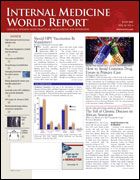First SNRI Designed for Hot Flashes Shows Good Efficacy
FROM THE AMERICAN COLLEGE OF OBSTETRICIANS AND GYNECOLOGISTS
Currently Under FDA Review
David Archer, MD
SAN DIEGO—A nonhormonal drug therapy may soon be available to postmenopausal women with difficult-to-treat hot flashes, and it may have the added benefits of improving sleep quality and mood, according to data presented at the American College of Obstetricians and Gynecologists annual meeting.
Results from the first phase 3 studies evaluating desvenlafaxine (Pristiq; Wyeth), a serotonin norepinephrine reuptake inhibitor (SNRI), for the treatment of moderate-to-severe vasomotor symptoms (ie, hot flashes and night sweats) associated with menopause showed that desvenlafaxine—the first SNRI designed specifically for this purpose—reduced the number and severity of hot flashes.
The drug also reduced the number of nighttime awakenings and mood disturbances in postmenopausal women who had hot flashes and night sweats, and it did not have any negative effect on sexual function, a common problem with some serotonin inhibitors, including some of the SNRIs.
Since the Women's Health Initiative, the search for nonhormonal alternatives to relieve menopausal symptoms has intensified. Over the years women have tried everything from black cohosh, to vitamin E, to red clover isoflavone, and even evening primrose oil. However, clinical studies of these so-called natural products have shown little or no efficacy compared with placebo.
IMWR
"To have a product that will be used and approved to treat hot flashes, you must show efficacy versus a placebo," principal investigator David Archer, MD, professor of obstetrics and gynecology, Eastern Virginia Medical School, and director, Endocrinology and Infertility Fellowship Program, Jones Institute for Reproductive Medicine and Endocrinology, both in Norfolk, Va, told . "The major issue is to show that it is effective."
Dr Archer reports that desvenlafaxine was most effective at doses of 100 mg and 150 mg. In phase 3 studies, desvenlafaxine reduced hot flash frequency and severity by 60% compared with placebo. The agent also had a quick onset of action—within 1 week, compared with 3 to 4 weeks for hormone therapy.
The 3 studies also demonstrated the safety and tolerability of desvenlafaxine. The most common side effect was nausea. Slowly uptitrating the dosage can help prevent nausea and vomiting, Dr Archer noted.
"Start the individual at 50 mg for the first week, and then go to 100 mg, and then after another week go to 150 mg to get the full higher dose," he said. "And when you stop, taper them down over a 2- to 4-week period."
If approved, this nonhormonal drug "will have a level of efficacy for hot flashes and will be an option we've not had available in the United States," he added.
Approval for the agent is expected in the third quarter of 2007. Desvenlafaxine is also under review for the treatment of major depressive disorder.
